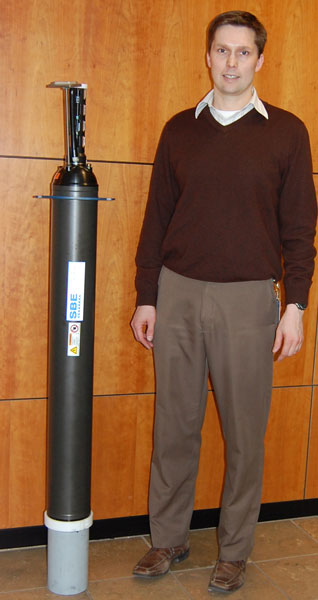 Navis Autonomous Profiling Float
Navis Autonomous Profiling Float
 Navis Autonomous Profiling Float
Navis Autonomous Profiling Float
![]()
![]() Print version
Compare
features across Navis product line
Print version
Compare
features across Navis product line
 SUMMARY
SUMMARY
FLOAT DESCRIPTION
The Navis float has a traditional layout, with the sensor head at the top, and the buoyancy bladders at the bottom. The Navis buoyancy engine uses a positive displacement piston pump to transfer silicon oil from internal to external reservoirs to increase the float volume and cause it to rise. The closed-loop, recirculating oil system utilizes a seamless natural rubber external bladder, and an oil reservoir filled to 300 ml (> 175 ml required for operation to 2000 dbars in Pacific Ocean). This system provides improved energy efficiency, better parking stability, and increased depth range over existing floats. Navis is self-ballasting, yielding reduced deployment preparation time.
The Navis buoyancy engine is augmented at the sea surface by inflation of an air reservoir. This surface-following function provides 400 ml of excess buoyancy to improve surface communications. The open-loop air buoyancy system uses a seamless, natural-rubber, external bladder and oil-augmented bladder crush prevention.
At the surface, Navis uses a Garmin 15xL-W GPS to acquire positional information, with a mean acquisition time of 70 seconds. It then transmits the acquired data via an Iridium Transceiver 9523, with a nominal transmission time of 275 seconds for a 2000 dbar profile cycle (2 dbar bins of CTD data). The Iridium antenna is mounted on the CTD end cap, and is supported by the CTD cell guard.
The Navis aluminum hull has a smaller diameter and length than existing floats, providing a lightweight and cost-effective package that requires less energy to operate. The float is powered by twelve lithium DD batteries in a Sea-Bird battery pack. The battery pack provides sufficient power for 300 CTD profile cycles to 2000 dbars.
CTD DESCRIPTION
The SBE 41CP CTD measures temperature, conductivity, and pressure continuously at 1 Hz through ascent and provides high accuracy, resolution, and stability. The pump-controlled, T-C ducted flow configuration minimizes salinity spiking caused by mismatch of temperature and conductivity measurements. The carefully engineered anti-foul protection includes anti-foulant devices, a U-shaped flow path, and an integral pump. On the floats ascent, as it approaches 10 to 5 dbars beneath the ocean surface, the pump turns off. The U-shaped flow path prevents sea surface oils and contaminants from being ingested while proceeding through the ocean surface skin and sitting at the surface during data transmittal. Between profiles, the pump is off. The U-shaped flow path prevents water flow through the system caused by waves or currents; minute amounts of anti-foulant concentrate inside the conductivity cell to minimize bio-fouling.
SPECIFICATIONS
Science Data (SBE 41CP CTD)
| Initial Accuracy | Stability | |
| Temperature | ± 0.002 șC | 0.0002 șC / year |
| Salinity | ± 0.002 PSS-78 | 0.001 PSS-78 / year |
| Pressure | ± 2 decibars | 0.8 decibars / year |
 Float Operation
Float Operation
Minimum fractional volume change: 1.70%
Depth rating: 2000 decibars
Communications: Iridium Transceiver 9523 -- RUDICS, circuit switched. Nominal transmission time 275 sec for 2000 dbar profile cycle (2 dbar bins of 1 Hz CTD data)
Position: GPS, Garmin 15xL-W, mean acquisition time 70 sec
Park interval: 1 - 15 days
Materials: Aluminum hull, seamless natural-rubber external bladders
Oil reservoir: 300 ml
Ballasting: Self-ballasting, 1 day to equilibrate
Weight in air: Less than 18.5 kg
Box: Stackable, export-compliant
Self-activation: Starts operating automatically on deployment, when pressure reaches user-programmable setpoint
Internal batteries: 4 packs of 3 DD lithium sulfuryl chloride cells (cannot ship in passenger aircraft; Class 9 Dangerous Goods). Each pack has open circuit voltage of 10.8 V with 30 AH capacity, yielding 1166 kJ (4664 kJ for 4 packs).
Power consumption: 11 kJ for a 2000-dbar CTD profile cycle
Power endurance: 10 years or 300 2000-dbar cycles
Memory: CTD stores one 2000 decibar CTD profile; Navis stores 64 2000-dbar CTD profiles
Dimensions: Hull diameter 14 cm (5.5 inches), Ring diameter 24 cm (9.5 inches), Total length 159 cm (62.7 inches)
ADDITIONAL INFORMATION / LINKS:
Documentation -- manual, photos, technical papers, application notes, etc.
Links to Other Products of Interest
![]()
Specifications are subject to change without notice.
Sea-Bird Home Phone: (+1) 425-643-9866 E-mail: seabird@seabird.com